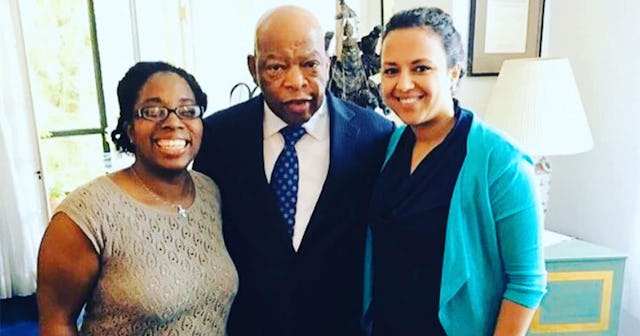What Representative John Lewis's Death Means To Black America

In 2017, I had the opportunity to meet Rep. John Lewis at the commencement ceremony of the graduating class of Bard College. I stood side by side with the congressman, taking in the moment while at a lunch at the home of the college President. I stood shoulder to shoulder with a man who not only walked with Dr. Martin Luther King, Jr. and rallied for equality and justice during a time I’ve only read about, but who humbly continued a fight much greater than he.
His death came as a shock to many, including myself. In the days which followed, I could not help but think about what this loss means: how would, we as Black America, carry on his legacy? His courage, dignity, resilience, and his incredible fight for equality for Black Americans will live on in the peaceful Black Lives Matter protests. For me, his death is a reminder that legacies are birthed to life by Rep. Lewis and countless others like him, made through hopes and dreams which may be challenged by others.
Courtesy of Nikkya Hargrove
In the opening lines of his address to the graduating Class of 2017, he says, “This is your day, enjoy it. Take in a long deep breath and take it all in, but tomorrow you must be prepared to roll up your sleeves because the world is waiting for talented men and women to lead it into a better place.”
His call to action from three years ago still holds today — the fight for a better place is alive and well. That call to action is never over, especially not now. As we look at the sea of faces and people, young and old, marching through the streets fighting for justice and equality, it is here that Rep. John Lewis’s legacy lives on. We must get up every single day, live in the America we call home, and respect and love our brothers and sisters. Even on the days when it seems impossible, like when I feel the urge to flee, pack up my family and move to a place where people are respected, protected, and treated fairly. But this is my home, just like it was for Rep. Lewis and his family.
Courtesy of Nikkya Hargrove
For $300, Rep. Lewis’s father, a sharecropper, bought 110 acres of land in 1944, land his family still owns today. On the land, the family raised chickens, cotton, peanuts, corn, cows, and hogs. As a child, he wanted to preach the gospel and his only congregation were his cousins and the chickens he was charged with taking care of. The land that his entire family cared for, loved, and held onto for the past 75 years is a testament to what we must continue to do as Black America — stake claim to the land our ancestors helped build by buying, living on and maintaining land for generations to come – for the health and wealth of our own families.
I cannot flee my home or uproot my family in fear of our government, in fear of what my community may (or may not) do in support of hate. I want my kids especially to be able to tell the story that we waited it out, that we took up the reins and walked arm in arm towards a better tomorrow.
You will live to tell the story. You can do it. As you go out there, do your work. Never become bitter or hostile. Never get lost in a sea of despair; keep the faith. Keep your eyes on the prize. Never hate. As Dr. Martin Luther King Jr. said, and Rep. Lewis reminded us in 2017, “Hate is too heavy a burden to bear.” We all have a story to tell, and when we face struggles — when hate meets us at the entryway, violating our hopes and dreams for a better tomorrow — we must remember that that is simply part of our story. And that we’re actively working to change the narrative.
Jeff Hutchens/Getty
Dr. King also famously said that our foremothers and our forefathers may have come to this great land in different ships, but we are all in the same boat now, and we must look out for each other. We are one people, one family. We all live in the same figurative house … so we must learn to live together.
On the hardest of days, I worry. The times when I read articles that keep me up at night about the final moments of Breonna Taylor’s life, or think of what Botham Jean must have felt as he settled into eating his bowl of ice cream and relaxing in his own home before being murdered by a cop. Or the fear which settled into the pit of Ahmaud Arbery’s stomach when he saw the gun aimed at him — I worry. I worry about my safety, and my kids’, as I know so many of my Black brothers and sisters do.
But we have a mandate, to carry on the legacies of Black leaders like Rep. John Lewis, who came before us and showed us by example and their untimely deaths, that our stories are forever connected — and the fight for a just, fair, and equal society is within reach.
This article was originally published on